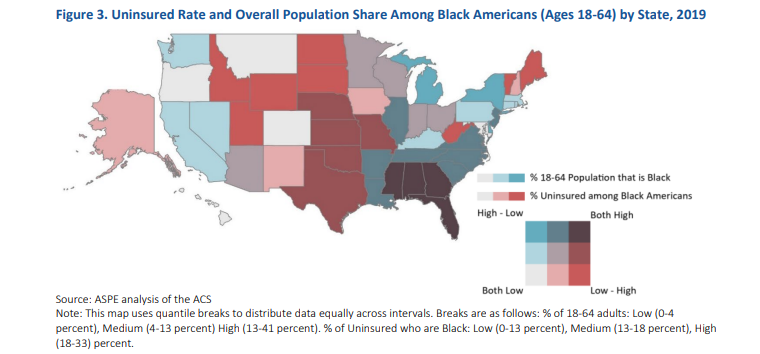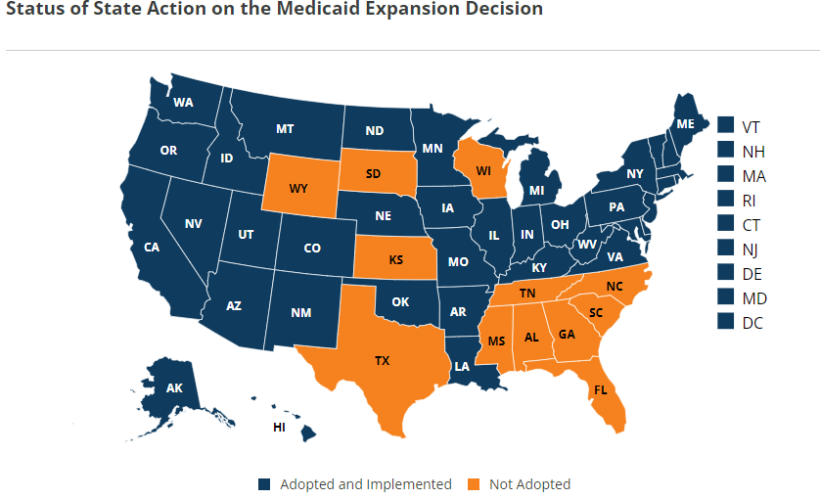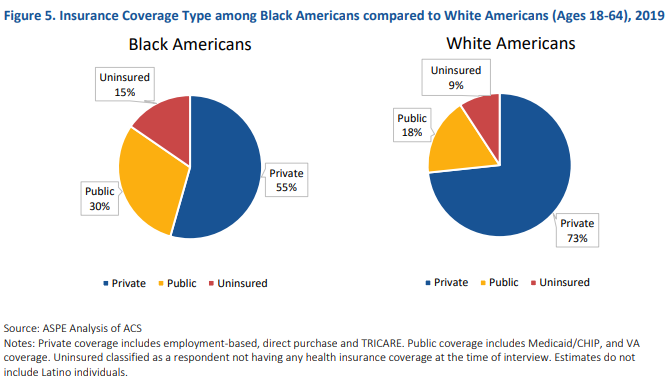In the United States, blacks have less access to health care and experience chronic diseases, morbidity and mortality at significantly higher rates than the U.S. population as a whole. Recently, the ASPE took a closer look at health insurance coverage & access to care among Black Americans.
While access to health care for Black Americans has improved from 2011-2020, the disparity in affordable health care between Black and White Americans still persists.
12% of Black Americans do not have any form on health care coverage, making us the demographic with the lowest rates of health care insurance. However, The uninsured rate among Black Americans decreased by 8 percentage points since the implementation of the ACA’s coverage provisions.

The Affordable Care Act's Medicaid expansion and subsidies for private health insurance helped dramatically lower the uninsured rate in the U.S. but people of color still remain more likely to be uninsured than their white counterparts. In a new report, the Urban Institute looks at how the uninsured rate has changed among African American Latinos in California, Texas and Florida.

Medicare expansion Source
States that have not adopted and implemented Medicare expansion report significantly higher rates of Black Americans without health insurance coverage. The study finds that Black Americans are more likely to be uninsured than White Americans in all states, however, in states that have adopted and implemented Medicaid expansion, the gap between the rates of uninsured Black and White Americans is significantly smaller than in non-Medicaid expansion states.

Black Americans are also less likely to have private health insurance coverage compared to white Americans. The reasons for this include of a lack of work opportunities and higher unemployment rates in the black community, which makes it difficult for African Americans to afford private health insurance. Also, White Americans often get offered better health insurance plans at their jobs compared to Black Americans.
Black Americans have less access to health care due to lower rates of health insurance coverage, discrimination in health care, & lower incomes making health care unaffordable for many black families.
The United States has one of the most expensive health care systems in the world. In most countries access to health care is a basic human right and is free for all citizens, however in the U.S. it is a service that only the privileged can afford. Thus, disadvantage Americans who are already struggling to keep up with rising costs of living are left out and cannot afford quality healthcare.
The legacy of slavery is still with Black Americans. It continues to place them at a disadvantage in society. This gap causes the remaining barriers to prevent Black Americans from receiving the health care they need. The discrimination that Blacks in the U.S face, places them in a situation where they are more likely to need health care services. Unfortunately, they are more likely to be discriminated and unable to obtain the health care services they need.
Black Americans are more likely to face discrimination when seeking healthcare, from being refused care, to receiving worse quality of care, according to the report. More than 30% of black people said they had experienced discrimination when seeking healthcare, compared with just 15% of white people.
African Americans are more likely to be diagnosed with high blood pressure, diabetes or cancer at an earlier age than whites. While it's true that cardiovascular health and cancer risks increase with age in both white and African American populations, the median age of diagnosis for African Americans often is younger.
Blacks are also at higher risk for heart diseases, stroke, cancer, asthma, influenza, pneumonia and HIV.
The Black community suffers from a staggering amount of undiagnosed and untreated mental health issues. This can be attributed to the lack of mental health facilities in many cities & black neighborhoods around the country, lack of understanding of mental health in many Black communities, and also the fear of going to a White owned mental health facility that may not have culturally competent staff.
Last year, The Root reported on a study by the Department of Health and Human Services that found that many Black people, “blamed their mental health issues on the pressures to be successful and work hard,” according to a recent NPR report.
Black people do not get the help they need for depression and anxiety because of a belief that we are supposed to suffer in silence. Mental illness is seen as a sign of weakness rather than an illness.
While access to health care for Black Americans has improved from 2011-2020, the disparity in affordable health care between Black and White Americans still persists.
The disparity in health insurance coverage
12% of Black Americans do not have any form on health care coverage, making us the demographic with the lowest rates of health care insurance. However, The uninsured rate among Black Americans decreased by 8 percentage points since the implementation of the ACA’s coverage provisions.

The Affordable Care Act's Medicaid expansion and subsidies for private health insurance helped dramatically lower the uninsured rate in the U.S. but people of color still remain more likely to be uninsured than their white counterparts. In a new report, the Urban Institute looks at how the uninsured rate has changed among African American Latinos in California, Texas and Florida.

Medicare expansion Source
States that have not adopted and implemented Medicare expansion report significantly higher rates of Black Americans without health insurance coverage. The study finds that Black Americans are more likely to be uninsured than White Americans in all states, however, in states that have adopted and implemented Medicaid expansion, the gap between the rates of uninsured Black and White Americans is significantly smaller than in non-Medicaid expansion states.

Black Americans are also less likely to have private health insurance coverage compared to white Americans. The reasons for this include of a lack of work opportunities and higher unemployment rates in the black community, which makes it difficult for African Americans to afford private health insurance. Also, White Americans often get offered better health insurance plans at their jobs compared to Black Americans.
Why do minorities have less access to healthcare
Black Americans have less access to health care due to lower rates of health insurance coverage, discrimination in health care, & lower incomes making health care unaffordable for many black families.
The United States has one of the most expensive health care systems in the world. In most countries access to health care is a basic human right and is free for all citizens, however in the U.S. it is a service that only the privileged can afford. Thus, disadvantage Americans who are already struggling to keep up with rising costs of living are left out and cannot afford quality healthcare.
The legacy of slavery is still with Black Americans. It continues to place them at a disadvantage in society. This gap causes the remaining barriers to prevent Black Americans from receiving the health care they need. The discrimination that Blacks in the U.S face, places them in a situation where they are more likely to need health care services. Unfortunately, they are more likely to be discriminated and unable to obtain the health care services they need.
Black Americans are more likely to face discrimination when seeking healthcare, from being refused care, to receiving worse quality of care, according to the report. More than 30% of black people said they had experienced discrimination when seeking healthcare, compared with just 15% of white people.
African American Health Care Disparity Statistics
- Georgia, Alabama, Florida, & Mississippi are the states with the highest percentage of Black Americans and also experience the highest rates of uninsured Black Americans.
- 37% of all uninsured black Americans live in these three states: Florida, Texas, and Georgia.
- 10% of Black Americans delay needed health care due to costs.
Health issues in the black community
African Americans are more likely to be diagnosed with high blood pressure, diabetes or cancer at an earlier age than whites. While it's true that cardiovascular health and cancer risks increase with age in both white and African American populations, the median age of diagnosis for African Americans often is younger.
Blacks are also at higher risk for heart diseases, stroke, cancer, asthma, influenza, pneumonia and HIV.
Mental Health Issues within the Black community
The Black community suffers from a staggering amount of undiagnosed and untreated mental health issues. This can be attributed to the lack of mental health facilities in many cities & black neighborhoods around the country, lack of understanding of mental health in many Black communities, and also the fear of going to a White owned mental health facility that may not have culturally competent staff.
Last year, The Root reported on a study by the Department of Health and Human Services that found that many Black people, “blamed their mental health issues on the pressures to be successful and work hard,” according to a recent NPR report.
Black people do not get the help they need for depression and anxiety because of a belief that we are supposed to suffer in silence. Mental illness is seen as a sign of weakness rather than an illness.
Download the app and join the community.
